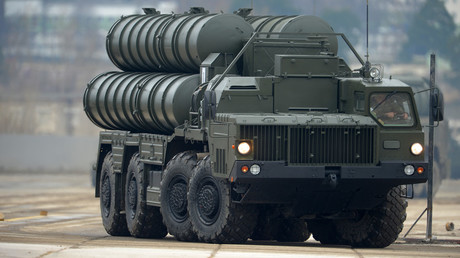Erdogan hopes for ‘joint production’ of S-500 with Russia, even as S-400 is still being delivered
Turkey has proposed that it co-produce Russia’s next-generation S-500 air systems, President Recep Tayyip Erdogan said. It comes as Washington is trying to dissuade Ankara –and prospective buyer Riyadh– from acquiring the S-400.
“Russia provided us with a loan for the S-400 systems on very reasonable terms. We will get to joint production during the second and third stages [of the contract implementation]. I’ve also proposed that Russia produce the S-500 jointly,” Erdogan said on Wednesday.
While Russian officials have neither confirmed nor denied plans for joint production of the S-400 systems, Russia’s president did not rule out such a possibility. “We don’t have any military or political concerns over it, there are no limitations,” Vladimir Putin said in April, stressing that the possible joint productions were not a political, but a “purely business issue.”
The joint production of the next-generation S-500 system, however, appears to be more of a longer-term possibility, as it is still under development. It remains unclear when its production even in Russia might actually start. Putin revealed that the ambitious system will be able to strike targets at “extremely high altitudes, including low orbit,” and the reported completion date is 2019-2020.
Moscow and Ankara signed a $2.5 billion agreement for procurement of Russia’s S-400 Triumph system in December. The first batch was expected to be delivered in 2020, but Russia agreed to move this forward in March. The first systems are expected to reach Turkish soil in mid-2019.
Turkey has endured tremendous pressure from the US, which at first expressed “concerns” over the S-400’s lack of “interoperability” with NATO-standard systems, but then resorted to open threats. Washington has recently mulled an idea to halt an already agreed-upon delivery of F-35 fighter jets to Turkey. Ankara, however, remains adamant about its desire to lay hands on the state-of-the-art Russian weaponry. Earlier this week Erdogan reiterated that he was acquiring the S-400 not just for show, but “will use them if need be.”
Turkey is not the only county Washington is trying to talk out of buying the Russian technology. The US would continue to dissuade Saudi Arabia from buying weaponry from Russia, as such deals would result in US sanctions, Assistant Secretary of State for Near Eastern Affairs nominee David Schenker said on Thursday.
“I would work with our allies to dissuade them, or encourage them, to avoid military purchases that would be potentially sanctionable,” Schenker said during a confirmation hearing. “In other words, I would tell Saudi Arabia not to do it.”
Joint military projects have proved to be quite sensitive; some see them basically as opportunities to procure technologies from others, while a limited production in a second country may not prove as profitable as expected. One such project mired with problems is the Russian-Indian Fifth Generation Fighter Aircraft (FGFA) – an export iteration of the Su-57 multirole fighter jet. The project never progressed from its early stages, as India gradually reduced its participation in the development, according to media reports. Delhi has also repeatedly criticized the work of Russian developers, urging them to improve the plane’s features beyond the ones envisioned in the contract – and even to fully disclose the technologies used.
Indian participation in the project eventually reduced to “development” of the plane’s tires, cockpit indicators, basic targeting systems and some other minor components. The latest reports suggest FGFA may have come to a complete halt, as Indian developers claimed they had all the technologies needed to produce a 5th-gen jet domestically and without Russia’s help.
If you like this story, share it with a friend!







Comments are closed.